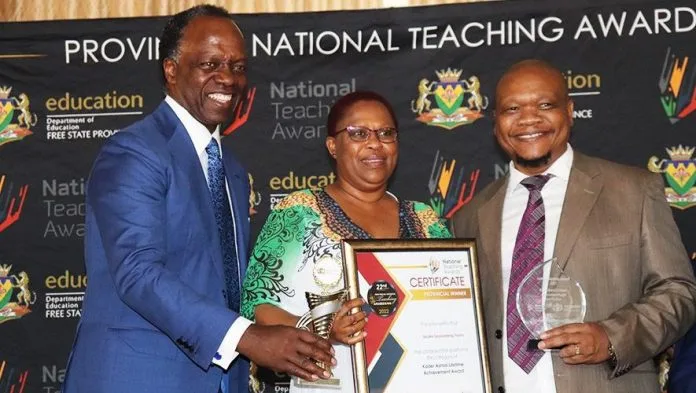Every year, the bell rings for Free State teachers to take a break from the classroom and be celebrated for their teaching excellence. This year was no different, as teachers nominated for the provincial stage of the National Teaching Awards (NTAs) gathered in glamour and style at Imvelo Safari Lodge, some 6km outside Bloemfontein, for the 22nd edition of the annual provincial teachers’ showdown. The teaching awards, which were hosted on the 14th of October, were organised by the Free State Department of Education in partnership with its various stakeholders. Their aim was to recognise the province’s top-tier teaching talent for their innovation, productivity and passion.
Consummate business leader and chairperson of the National Education Collaboration Trust (NECT), Sizwe Nxasana, delivered the keynote address. Nxasana is also the CEO and founder of Future Nation Schools.
Free State MEC for Education, Dr Tate Makgoe, offered congratulatory remarks to the winners.
The ceremony’s opening speech was given by Nneheng Molapo, a 2021 National Teaching Awards (NTAs) First Prize Winner from the Thabo Mofutsanyane District. Molapo has also been shortlisted for the 2022 African Union Teacher Prize, the only woman among South Africa’s contestants.
The passionate Grade R teacher described winning an NTA as “life-changing”, saying it exposed her to the beauty of her profession. “Believe me when I say it is wonderful being a teacher. It is one thing I would never trade for anything. It is even more [wonderful] being an excellent teacher where you are appreciated,” a joyous Molapo remarked.
Molapo’s award was in recognition of how she not only noticed that one of the children in her school had a far bigger problem than just ill-discipline, but her intervention led to the child being diagnosed with autism and being placed in a specialist school. “If a teacher sees that a child needs help here, that help should be given immediately,” she shared her child mentoring philosophy.
Molapo further hailed her school leadership, district seniors and the provincial department for creating a climate that encourages and rewards excellence.
“We have the best leader who makes sure that he gets us the best. FS is not number 1 by mistake or by default, it’s number 1 because it is led by the best,” she asserted, referring to Tate Makgoe’s acclaimed record at the helm of teaching and learning in the Free State.
Making his keynote speech, Nxasana held that teachers have to be capacitated if South Africa is to reap the fruits of its massive investment in education. “We all know that there can never be an education system which has better quality of education which is better than the quality of its teachers. It just can’t happen. There are fundamental issues that we need to fix in our country if we are saying as a people and as a country the teaching profession is important, which it is,” the former FirstRand CEO said.
Additionally, he called for an improved coordination between government and institutions of higher learning in ensuring that the country produces teachers who can respond to many developments in the areas of policy and technology. “The universities that train us as teachers, are they teaching us correctly in initial teacher education? Are they giving us the skills and competencies, and the knowledge and content that enable us to go and teach?” asked the former chairman of the National Student Financial Aid Scheme (NSFAS).
Nxasana problematised the fact that at the University of South Africa (Unisa) alone, which accounts for 54% of education students nationwide, there are more senior phase graduates than there are foundation ones. “If you have not built the foundation in pre-school, at foundation and intermediate phases, you are forever playing catch-up, and it is a fundamental structural problem that we have in this country,” he said.
For South Africa to have fully developed learners, presented Nxasana, the government has to attract more men to teach in primary schools. This he believes will reduce most of our social ills. About 67% of learners at Future Nation Schools don’t have present fathers, he revealed, adding that even though “women are the pillars of our education system”, children nevertheless need to be taught by both men and women for holistic development. Again, Nxasana stated that it’s mathematics and not mathematical literacy that has the answer to SA’s developmental challenges, saying: “It’s not possible for us to meaningfully participate in 4IR if we are not producing the [necessary] number of learners that are doing mathematics, that are passing mathematics.”
A chartered accountant by training, Nxasana completed his Post-Graduate Certificate in Education (PGCE) with Unisa, before joining his teaching staff at Future Nation Schools, where he teaches commercial subjects.
Currently, Future Nation Schools has 120 teachers on its payroll.
Nxasana assured teachers that of all his accomplishments in business and leadership, the greatest decision of his life was choosing to become a teacher, calling it “the best thing I have ever done in my life”.



